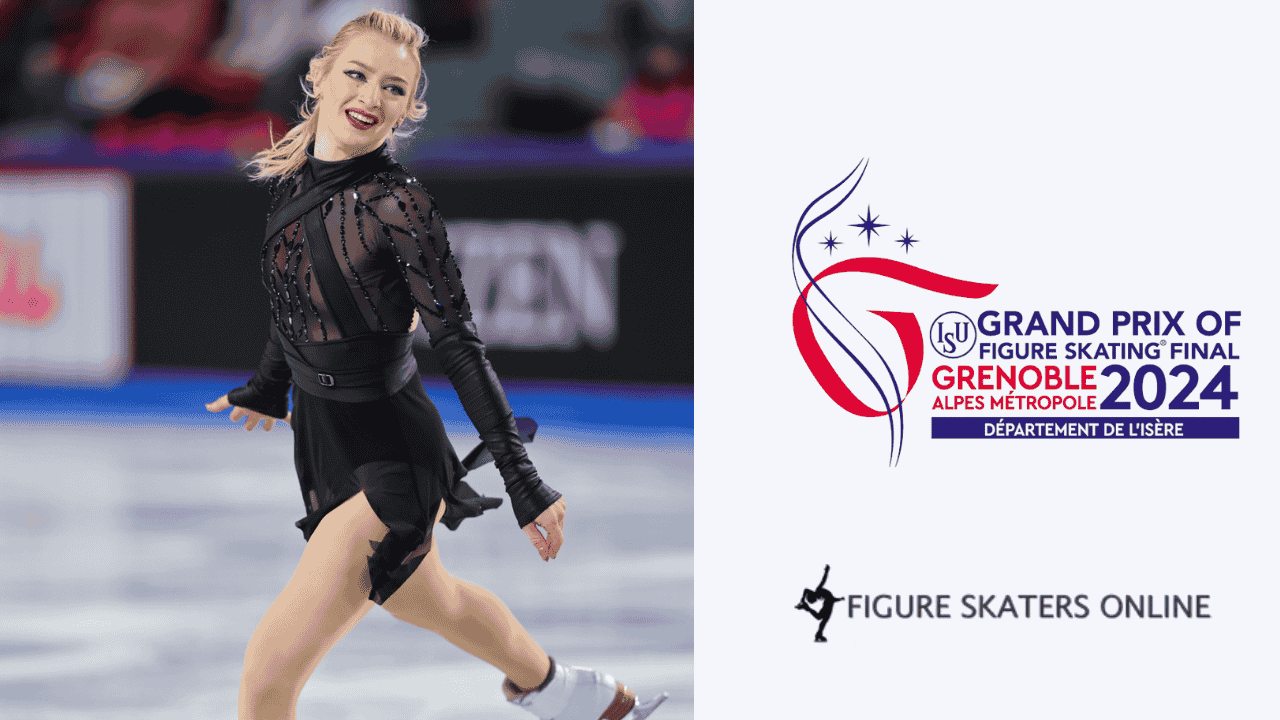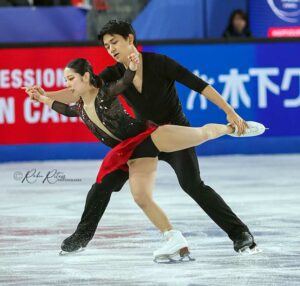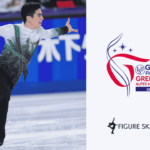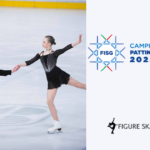Grenoble, France — The 2024 ISU Grand Prix Final was held in Grenoble, France Dec. 5-7. The event culmination of the six Grand Prix Series events that took place in October and November.
Here’s a recap of the event.
Men
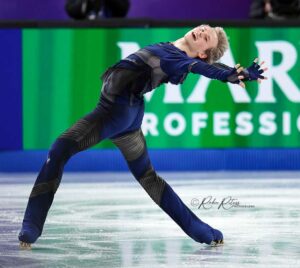 World Champion Ilia Malinin of the U.S. won his second straight Grand Prix Final, and did it while attempting to make some history.
World Champion Ilia Malinin of the U.S. won his second straight Grand Prix Final, and did it while attempting to make some history.
Malinin had an almost 12-point lead after the short program. In his “I’m Not a Vampire” by Falling in Reverse free skate, Malinin did his quadruple Axel for the first time this season, but the jump was called on the quarter. Malinin was trying to be the first to attempt six different types of quadruple jumps and do perform only quads, a total of seven, in one program. However, for Malinin, all of them were either a quarter under-rotated or totally under-rotated. He also fell on his quadruple Lutz. Because of the under-rotations, he finished second in the free skate with a score of 186.69, but managed to remain in first place with a score of 292.12. Malinin is the second U.S. man to win back-to-back Grand Prix Final golds (Nathan Chen, 2017-18).
“I think going into Grand Prix Final I wanted to challenge myself with my technical ability as well as try to incorporate the artistry that I’ve been working through the past few seasons to really perfect. It was a challenge for me to want to come out and try to put everything into one program and see how it goes,” Malinin said following his free skate. 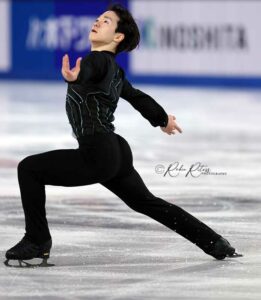
In Grenoble, reigning World silver medalist Yuma Kagiyama, of Japan, won his second Grand Prix Final medal. In second after the short program, Kagiyama opened his Flamenco program with a quadruple flip. He also produced a quadruple toe-triple toe combination and a solo quadruple toe, His only mistake was that he doubled his planned quadruple Salchow. He won the free skate with a score of 188.29. His total score of 281.78 was enough to take the silver medal. Kagiyama won the bronze medal at the event last season.
“I regret that even though I was able to do all the elements of my program during my training, I couldn’t do them as well as I wished today because I was so tense. I hope to learn to control my emotions better so not to be so tense,” he said.
Japan’s Shun Sato sat in fourth place after the short program. In his “Nostos” free skate, Sato landed three quadruple jumps — Lutz and two toes. He also executed two clean triple Axels. Sato fell on his quadruple flip. He earned a free skate score of 184.54 and a total score of 270.82 to move up a spot to take the bronze, his first medal in the Grand Prix Final.
“It’s been two years since I was in the final and I’m very happy with today’s performance,” Sato said. “Because I failed during the short program, I tried to not care about it too much today. Today in my performance I did a high [quad] Lutz, which increased my score, so I’m happy with the results.
Italy’s Daniel Grassl, who is back after missing the 2023-2024 season, finished fourth with 254.96 points. Kazakhstan’s Mikhail Shaidorov became the skater to land a triple Axel-Euler-quad Salchow combination, but a fall on his quadruple flip and some under-rotations caused him to drop from third to fifth with a score of 253.75. France’s Kevin Aymoz placed sixth (238.63). The arena in Grenoble was the rink where Aymoz first started skating.
Prior to the competition, France’s Adam Siao Him Fa withdrew from the event due to injury. He was replaced by Shaidorov, who was the first alternate.
Women
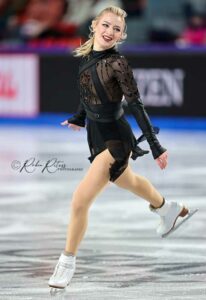 The qualifiers for the Grand Prix Final included five Japanese skaters and U.S. Champion Amber Glenn, who was competing in her first Grand Prix Final. After a messy short program, Glenn lead the field and was less than a point ahead of Mone Chiba. Both women were competing in their first Grand Prix Final.
The qualifiers for the Grand Prix Final included five Japanese skaters and U.S. Champion Amber Glenn, who was competing in her first Grand Prix Final. After a messy short program, Glenn lead the field and was less than a point ahead of Mone Chiba. Both women were competing in their first Grand Prix Final.
In her “I Will Find You the Return” free skate, Glenn opened with a huge triple Axel and then followed it up with five clean triple jumps. Her only mistake was she doubled her planned triple Salchow. She earned a free skate score of 142.03 and a total score of 212.07 to win the title and claim the first Grand Prix Final title for a U.S. woman since Alissa Czisny won the title in 2010.
“This year started off with my first-ever international gold and now this is going to be my fourth, which is so incredible to even say,” Glenn said following her skate. “I’m just so honored and blessed to be considered at that top contention of competition.”
Glenn also is the third U.S. woman in history to go undefeated on the Grand Prix Series and at the Grand Prix Final in the same season, following Michelle Kwan (1995-96) and Sasha Cohen (2002-03).
Skating before Glenn, Chiba’s “Ariana Concerto No 1” free skate contained six clean triple jumps, including triple flip-triple toe combination and triple Lutz-double Axel sequence. The 2024 Four Continents Champion earned a free skate score of 139.52 and a total score of 208.85 to take the silver medal.
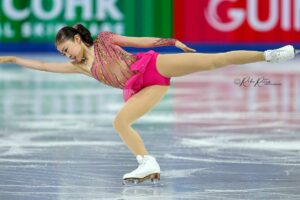 “I felt nervous as if I was doing a World Championship,” Chiba said.
“I felt nervous as if I was doing a World Championship,” Chiba said.
“I’m satisfied about today’s performance because I didn’t fall and could land the last flip and loop. That is why my score today was very good as I almost beat my personal best,” she added.
After a disappointing short program, the reigning Grand Prix Final Champion and three-time World Champion Kaori Sakamoto found herself sitting in fourth place. But Sakamoto fought her way back in her “All That Jazz” free skate. She completed four clean triple jumps, but had three triple jumps called under-rotated. She earned a free skate score of 137.15 and a total score of 201.13 to move up to claim the bronze medal. This medal marked Sakamoto’s third Grand Prix Final medal.
“Compared to the short program, I was able to approach it with more confidence and I was able to give it my all, with the feeling that I wanted to show what I had been practicing, so I am satisfied with today’s program,” Sakamoto told the media.
Wakaba Higuchi, who was in sixth after the short program pulled up to fourth overall with a score of 195.96. Hana Yoshida slipped from third to fifth with 194.02 points while Rino Matsuike finished sixth with 189.02 points.
Pairs
Like the men, before the competition, reigning World champions Deanna Stellato-Dudek and Maxime Deschamps, of Canada, who were the top qualifiers for the event, withdrew due to Max recovering from an illness, according to Skate Canada.
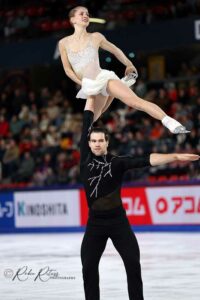 For the second year in a row, the German team of Minerva Fabienne Hase and Nikita Volodin took home the title in the pairs’ event at the Grand Prix Final. Nearly tied with Riku Miura and Ryuichi Kihara, of Japan, after the short program, Hase and Volodin pulled away from the 2023 World Champions, with an almost clean “Four Seasons” free skate. The two opened with a triple twist, and followed it up with a side-by-side triple toe-double Axel-double Axel sequence in which the final jump of the sequence was called under-rotated. Hase also two footed their side-by-side triple Salchow and hung on to the landing of the throw triple loop. They earned a free skate score of 141.38, which was first in the free skate, and a total score of 218.10, which was 0.34 points from their personal best score. Hase and Volodin became the first pairs team to go back-to-back as Grand Prix Final winners since Germany’s Aliona Savchenko and Robin Szolkowy in 2010 and 2011.
For the second year in a row, the German team of Minerva Fabienne Hase and Nikita Volodin took home the title in the pairs’ event at the Grand Prix Final. Nearly tied with Riku Miura and Ryuichi Kihara, of Japan, after the short program, Hase and Volodin pulled away from the 2023 World Champions, with an almost clean “Four Seasons” free skate. The two opened with a triple twist, and followed it up with a side-by-side triple toe-double Axel-double Axel sequence in which the final jump of the sequence was called under-rotated. Hase also two footed their side-by-side triple Salchow and hung on to the landing of the throw triple loop. They earned a free skate score of 141.38, which was first in the free skate, and a total score of 218.10, which was 0.34 points from their personal best score. Hase and Volodin became the first pairs team to go back-to-back as Grand Prix Final winners since Germany’s Aliona Savchenko and Robin Szolkowy in 2010 and 2011.
“We entered trying not to have too much expectations about placements. It was not easy, I was really nervous but we are glad,” Hase told the media following her skate.
“We gained a lot of confidence during the first half of competitions. We want to maintain that. There is still a lot of room to grow,” she added.
Miura and Kihara were skating in their first Grand Prix Final in two seasons. They missed last year Grand Prix Series due to injury. In their “Adios” by Benjamin Clementine free skate, the team opened with a triple twist, but then struggled with their side-by-side jumps as Miura doubled the triple toe and singled the first double Axel in the planned triple toe-double Axel-double Axel sequence. Miura also fell on the throw triple loop and stepped out and put a hand down on the throw triple Lutz. They earned a free skate score of 130.44, which was third in the free skate. They held on to second place with a total score of 206.71.
“Last season, we were out of the Grand Prix series because of injuries,” Miura said. “It is really good to be back on the circuit and to be back in the Final. We are satisfied on that front.”
“Last season, there was an injury to Ryiuchi. The season before I had an injury, it was difficult to be present to all events throughout the season. Our goal this season is to keep healthy, maintain that and get good results,” she added.
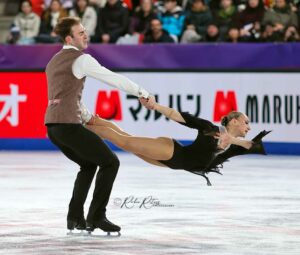 In their first senior Grand Prix Final as a team, Georgia’s Anastasiia Metelkina and Luka Berulava took home the bronze medal, which was the first Grand Prix Final medal for the country of Georgia. In their “A Necessary End” free skate, Metelkina and Berulava had a strong performance, earning positive GOEs on all but one of their elements. Their only mistake was that the double Axel in their triple Salchow-double Axel sequence was called on the quarter. They earned a free skate score of 133.52, which was second in the free skate, and a total score of 205.78 to finish third overall.
In their first senior Grand Prix Final as a team, Georgia’s Anastasiia Metelkina and Luka Berulava took home the bronze medal, which was the first Grand Prix Final medal for the country of Georgia. In their “A Necessary End” free skate, Metelkina and Berulava had a strong performance, earning positive GOEs on all but one of their elements. Their only mistake was that the double Axel in their triple Salchow-double Axel sequence was called on the quarter. They earned a free skate score of 133.52, which was second in the free skate, and a total score of 205.78 to finish third overall.
“I am very happy that we were able to win this first medal for our country. I want to thank everybody who participated on this success,” said Berulava.
Two-time ISU Grand Prix Final medalists Sara Conti and Niccolo Macii, of Italy, finished just off the podium with 200.06 points. Reigning U.S. Champions Ellie Kam and Danny O’Shea, who were making their debut in the Grand Prix Final, finished fifth with 198.26 points and Italy’s Rebecca Ghilardi and Filippo Ambrosini, who were the replacements for Stellato-Dudek and Deschamps, finished sixth with a total score of 181.52.
Dance
Two-time World Champions Madison Chock and Evan Bates claimed their second consecutive Grand Prix Final title. World bronze medalists Charlene Guignard and Marco Fabbri, of Italy, won their second consecutive Grand Prix Final silver medal while Great Britain’s Lilah Fear and Lewis Gibson claimed the bronze medal, which was their first Grand Prix Final medal.
To read more about the dance visit, visit our friends at Ice-Dance.com.


